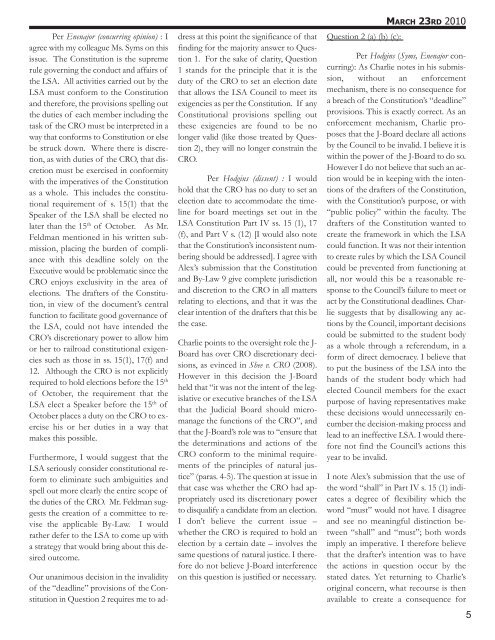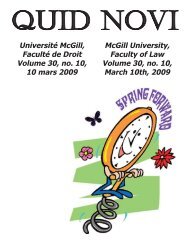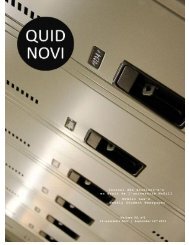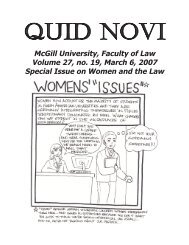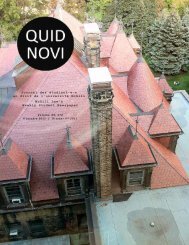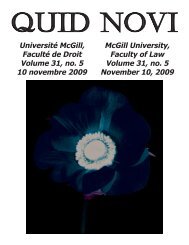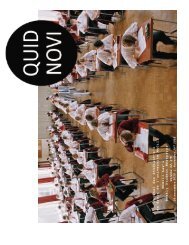March 23, 2010
March 23, 2010
March 23, 2010
You also want an ePaper? Increase the reach of your titles
YUMPU automatically turns print PDFs into web optimized ePapers that Google loves.
Per Enenajor (concurring opinion) :I<br />
agree with my colleague Ms. Syms on this<br />
issue. The Constitution is the supreme<br />
rule governing the conduct and affairs of<br />
the LSA. All activities carried out by the<br />
LSA must conform to the Constitution<br />
and therefore, the provisions spelling out<br />
the duties of each member including the<br />
task of the CRO must be interpreted in a<br />
way that conforms to Constitution or else<br />
be struck down. Where there is discretion,<br />
as with duties of the CRO, that discretion<br />
must be exercised in conformity<br />
with the imperatives of the Constitution<br />
as a whole. This includes the constitutional<br />
requirement of s. 15(1) that the<br />
Speaker of the LSA shall be elected no<br />
later than the 15 th of October. As Mr.<br />
Feldman mentioned in his written submission,<br />
placing the burden of compliance<br />
with this deadline solely on the<br />
Executive would be problematic since the<br />
CRO enjoys exclusivity in the area of<br />
elections. The drafters of the Constitution,<br />
in view of the document’s central<br />
function to facilitate good governance of<br />
the LSA, could not have intended the<br />
CRO’s discretionary power to allow him<br />
or her to railroad constitutional exigencies<br />
such as those in ss. 15(1), 17(f) and<br />
12. Although the CRO is not explicitly<br />
required to hold elections before the 15 th<br />
of October, the requirement that the<br />
LSA elect a Speaker before the 15 th of<br />
October places a duty on the CRO to exercise<br />
his or her duties in a way that<br />
makes this possible.<br />
Furthermore, I would suggest that the<br />
LSA seriously consider constitutional reform<br />
to eliminate such ambiguities and<br />
spell out more clearly the entire scope of<br />
the duties of the CRO. Mr. Feldman suggests<br />
the creation of a committee to revise<br />
the applicable By-Law. I would<br />
rather defer to the LSA to come up with<br />
a strategy that would bring about this desired<br />
outcome.<br />
Our unanimous decision in the invalidity<br />
of the “deadline” provisions of the Constitution<br />
in Question 2 requires me to address<br />
at this point the significance of that<br />
finding for the majority answer to Question<br />
1. For the sake of clarity, Question<br />
1 stands for the principle that it is the<br />
duty of the CRO to set an election date<br />
that allows the LSA Council to meet its<br />
exigencies as per the Constitution. If any<br />
Constitutional provisions spelling out<br />
these exigencies are found to be no<br />
longer valid (like those treated by Question<br />
2), they will no longer constrain the<br />
CRO.<br />
Per Hodgins (dissent) : I would<br />
hold that the CRO has no duty to set an<br />
election date to accommodate the timeline<br />
for board meetings set out in the<br />
LSA Constitution Part IV ss. 15 (1), 17<br />
(f), and Part V s. (12) [I would also note<br />
that the Constitution’s inconsistent numbering<br />
should be addressed]. I agree with<br />
Alex’s submission that the Constitution<br />
and By-Law 9 give complete jurisdiction<br />
and discretion to the CRO in all matters<br />
relating to elections, and that it was the<br />
clear intention of the drafters that this be<br />
the case.<br />
Charlie points to the oversight role the J-<br />
Board has over CRO discretionary decisions,<br />
as evinced in Shee v. CRO (2008).<br />
However in this decision the J-Board<br />
held that “it was not the intent of the legislative<br />
or executive branches of the LSA<br />
that the Judicial Board should micromanage<br />
the functions of the CRO”, and<br />
that the J-Board’s role was to “ensure that<br />
the determinations and actions of the<br />
CRO conform to the minimal requirements<br />
of the principles of natural justice”<br />
(paras. 4-5). The question at issue in<br />
that case was whether the CRO had appropriately<br />
used its discretionary power<br />
to disqualify a candidate from an election.<br />
I don’t believe the current issue –<br />
whether the CRO is required to hold an<br />
election by a certain date – involves the<br />
same questions of natural justice. I therefore<br />
do not believe J-Board interference<br />
on this question is justified or necessary.<br />
Question 2 (a) (b) (c):<br />
MARCH <strong>23</strong>RD <strong>2010</strong><br />
Per Hodgins (Syms, Enenajor concurring):<br />
As Charlie notes in his submission,<br />
without an enforcement<br />
mechanism, there is no consequence for<br />
a breach of the Constitution’s “deadline”<br />
provisions. This is exactly correct. As an<br />
enforcement mechanism, Charlie proposes<br />
that the J-Board declare all actions<br />
by the Council to be invalid. I believe it is<br />
within the power of the J-Board to do so.<br />
However I do not believe that such an action<br />
would be in keeping with the intentions<br />
of the drafters of the Constitution,<br />
with the Constitution’s purpose, or with<br />
“public policy” within the faculty. The<br />
drafters of the Constitution wanted to<br />
create the framework in which the LSA<br />
could function. It was not their intention<br />
to create rules by which the LSA Council<br />
could be prevented from functioning at<br />
all, nor would this be a reasonable response<br />
to the Council’s failure to meet or<br />
act by the Constitutional deadlines. Charlie<br />
suggests that by disallowing any actions<br />
by the Council, important decisions<br />
could be submitted to the student body<br />
as a whole through a referendum, in a<br />
form of direct democracy. I believe that<br />
to put the business of the LSA into the<br />
hands of the student body which had<br />
elected Council members for the exact<br />
purpose of having representatives make<br />
these decisions would unnecessarily encumber<br />
the decision-making process and<br />
lead to an ineffective LSA. I would therefore<br />
not find the Council’s actions this<br />
year to be invalid.<br />
I note Alex’s submission that the use of<br />
the word “shall” in Part IV s. 15 (1) indicates<br />
a degree of flexibility which the<br />
word “must” would not have. I disagree<br />
and see no meaningful distinction between<br />
“shall” and “must”; both words<br />
imply an imperative. I therefore believe<br />
that the drafter’s intention was to have<br />
the actions in question occur by the<br />
stated dates. Yet returning to Charlie’s<br />
original concern, what recourse is then<br />
available to create a consequence for<br />
5


